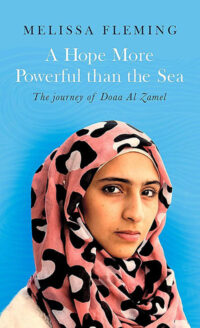Book review: A Hope More Powerful Than the Sea: the Journey of Doaa Al Zamel by Melissa Fleming
 I’m a little unsure how to feel about this book. Melissa Fleming is a UNHCR bigwig and she wanted to draw attention to the plight of refugees by highlighting one true story. The one she chose is a doozy. A Hope More Powerful Than the Sea: the Journey of Doaa Al Zamel is an action-packed and informative tale. But right from the start I had some concerns.
I’m a little unsure how to feel about this book. Melissa Fleming is a UNHCR bigwig and she wanted to draw attention to the plight of refugees by highlighting one true story. The one she chose is a doozy. A Hope More Powerful Than the Sea: the Journey of Doaa Al Zamel is an action-packed and informative tale. But right from the start I had some concerns.
Doaa Al Zamel had certainly been through the wringer by the time Fleming met her. She is Syrian, an educated young woman from a middle-class family. She had a place waiting for her at university in Damascus and took place in anti-government demonstrations during the Arab Spring, until the civil war made life intolerable in her home city Daraa.
The Al Zamel family fled to Egypt, where they were initially well looked after, before the sheer number of refugees turned the tide of public opinion and national policy. Doaa and her fiance – a fellow Syrian refugee she met in Egypt – tried to escape across the Mediterranean via people smugglers no less than three times before her final horrific journey ended in one of the worst shipwrecks in the Mediterranean. Doaa became a minor celebrity as the Italian press lauded her role in saving a baby.
So Doaa is a hero with a background that many Western readers can identify with and a tragic romance to boot (the fate of Doaa’s fiance is revealed in the first line of chapter one). She’s a devout Muslim and devoted to her family. She’s a young woman, making her both vulnerable and someone who never fought in a war herself. And she’s strong enough to have survived starvation, near drowning and more, but also struggled with what might have been an eating disorder from the start of being a refugee.
What I’m getting at is that the choice of Doaa as the subject of Fleming’s book is very calculated. Doaa and her story hit all the “right” notes to play on pity and concern, while educating the public about the plight of huge numbers of Syrian refugees. Fleming admits as much in the endmatter (there is not only an epilogue, but also a brief note from Doaa, a lengthy author’s note and an interview she did with a media outlet called Humans of New York). I understand Fleming’s intentions, which are good ones, but I think this obviousness undermines the message.
“The second time Doaa nearly drowned, she was adrift in the centre of a hostile sea that had just swallowed the man she loved. She was so cold she couldn’t feel her feet, and so thirsty her tongue had swollen in her mouth. She was so overcome with grief that if not for the two tiny baby girls in her arms, barely alive, she would have let the sea consume her. No land was in sight. Just debris from the shipwreck, a few other survivors praying for rescue, and dozens of bloated, floating corpses.”
My other quibble is perhaps the bigger one. Doaa clearly has a great story and I really think she should have been enabled to tell it in her own words, rather than it being relayed third person by someone who isn’t a professional writer. Perhaps if Fleming were a great journalist or ghost writer with bags of experience I would have felt this less keenly. But she’s never written a book before and it does show at times. Her writing is decent but not great, interspersing dramatic interpretations of scenes from Doaa’s life with infodumps about the Syrian War and the numbers of refugees in various regions.
It would have served Fleming’s purpose better if this were a first-person narrative, even if had to be written via interpreters and translators. There is a distance created by making Doaa’s tale third-person that prevents it from being as affective – and effective – as it could be.
I think that is why Shatila Stories is the better book. Though fiction, with a mix of first and third-person narrators, every author in the collection is themselves a refugee living in the refugee camp that is the setting of their stories. And that means even though the writing ability varies, the effect of the stories is much stronger.
Those concerns aside, I did still find this book gripping and moving. I think Fleming does well in addressing why Doaa leaves relative safety in Egypt and risks her life repeatedly in her quest to have a life, not just an existence. And she expresses even more clearly the many hurdles and obstacles that Doaa faced to stay in Europe.
First published 2017 by Flatiron in the US, Fleet in the UK.
Source: this was a Christmas present from my Dad.
One Comments
Comments are closed.